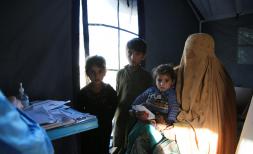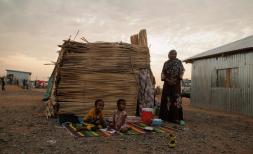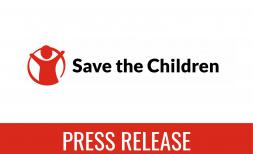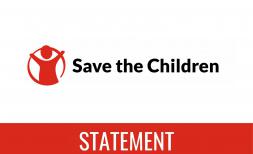COVID-19: Five crises facing children after 2 years of pandemic
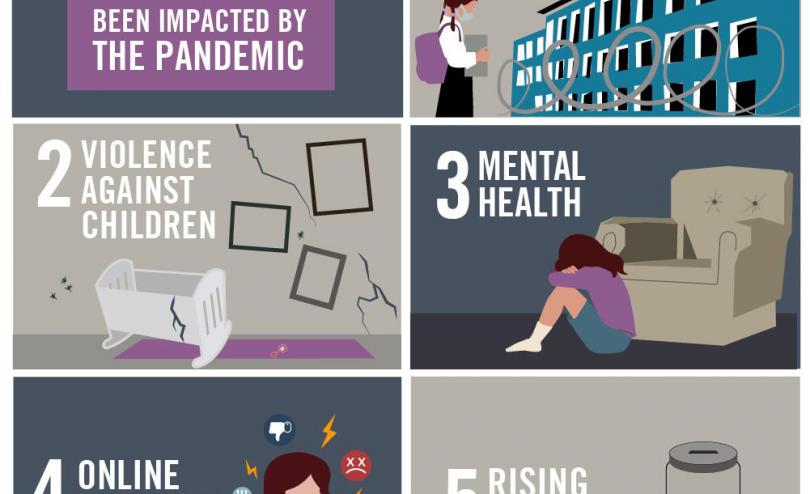
LONDON, 7 March, 2022 – From battling rising violence to worsening mental health, children have been severely impacted by two years of the COVID-19 pandemic with urgent action needed globally to prevent years of progress from being reversed, said Save the Children.
Since the World Health Organization (WHO) declared COVID-19 a pandemic on 11 March 2020, children’s physical and mental health, education and economic wellbeing have been put in jeopardy. There are fears the impact will be felt for years to come, as the world enters the third year of a global children’s crisis brought on by the collision of COVID-19, conflict and climate emergencies, according to experts from Save the Children.
An estimated 10% more children have been forced into poverty[i], mental health helplines have seen demand surge by as much as 7,000%[ii], about 2.8% of the world’s children remain out of school[iii], and children globally have reported a rise in both domestic[iv] and online abuse[v].
Kijala Shako, Director of Advocacy, Communications, Campaigns and Media for East and Southern Africa at Save the Children, said the impact of COVID-19 on children was downplayed at the start of the pandemic when evidence showed the physical impacts of the illness were more severe for adults. But after two years, the life-long physical and social impacts of the crisis have become starkly apparent.
“To protect an entire generation from the lasting impacts of COVID-19, the world needs to urgently ensure that all countries, especially low-income countries and fragile states, can respond to the pandemic effectively and build back better for children,” said Ms Shako.
Save the Children experts looked at five crises faced by children globally due to the COVID-19 pandemic:
1. RISE IN VIOLENCE
As in any crisis, children were at risk of violence over the past two years of the pandemic. Emerging evidence has revealed that economic shocks and school closures endured over this period have some correlation with increases in violence against both adults and children.
In a Save the Children survey of 25,000 people across 37 countries in 2020, children reported higher rates of violence when schools were closed compared to when attending class in person. It also revealed that one in five caregivers reported an increase in their use of negative or violent parenting methods. Latest figures from South Africa showed more than 350 children were killed in the last three months of 2021 and there was a 30% jump in attempted murders, with most of the violence taking place at home.
2. WORSENING MENTAL HEALTH
Children have been overwhelmingly affected by negative feelings as a result of the pandemic and the disruption to their lives, including from the lack of socialising and school closures—with uncertainty and stress contributing to staggering levels of loneliness, anxiety, and depression.
Save the Children set up a free counselling helpline to support children and young people’s mental health in India. Calls to the helpline spiked when the country faced record-breaking cases of COVID-19 in spring 2021, with a 7,000% increase in calls from March to April.
There are early indications that governments did not adequately respond to the huge increase in the mental health and wellbeing needs of children. An analysis of COVID-19 financing found that mental health programmes represented only 0.54% of US$2.98 billion allocated to the Global Humanitarian Response Plan, the UN’s global appeal to combat COVID-19, as of October 2020[vi].
3. RISE IN ONLINE VIOLENCE
Lockdown measures led to more children relying on technology to learn and stay in touch with friends and family. However, not all children had the knowledge or resources to stay safe online, putting them at risk of exploitation and online abuse and leading to worrying mental health effects.
Online abuse, harassment and bullying might have as many negative consequences as physical violations and abuse. In Denmark, a recent Save the Children study found that 42% of all children in the country have experienced online violence in the last year.
Delete-It, Save the Children’s counselling service in Denmark that specialises in helping children exposed to digital abuse and harassment, saw a massive 179% rise in queries from 2019 to 2021. As the pandemic dragged on, the helpline also saw a sharp rise in the number of queries with a 50% spike from 1,319 in 2020 to 1,974 in 2021.
4. SCHOOLS CLOSE DOORS
The COVID-19 pandemic caused the biggest education crisis in history, with an entire generation of students unable to go to school—more than 1.6 billion children at its peak. Currently, school closures are still affecting 43.5 million learners in six countries,[1] or 2.8% of the world’s total student population.
Prolonged school closures have worsened inequalities, badly affecting children who lack access to technology and other support for home learning—and, resulting in learning losses and increased dropout rates. In Lebanon, where schools shut their doors for 49 weeks due to COVID-19, students are still reeling from the effects of repeated school closures and an economic crisis that has aggravated learning loss.
Eliot*, 11, is a Palestinian refugee living in a camp in Lebanon where he goes to school every other week due to the COVID-19 pandemic. When the pandemic was first declared, he was forced to learn remotely and now worries that he is falling behind in his studies.
“We couldn’t go to school because teachers and students were getting COVID-19, so we switched to online. Online is much worse. I did not understand the lessons well because of electricity and internet cuts,” Eliot said. “I’m worried I won’t know how to read and write when I grow up and if someone asks me to read, I wouldn’t know how.”
Since October 2019, Lebanon has experiences one of the world’s worst financial meltdowns, putting online learning out of reach for many students. A 2020 survey conducted by Save the Children found that 69% of children reported difficulty accessing distance learning, with one in three saying it was too expensive. In a follow-up survey in 2021, all children noted that the pandemic continues to affect their right to education.
5. SURGE IN POVERTY
Since the onset of the pandemic, an estimated 100 million additional children have been driven into poverty – a 10% increase compared to pre-COVID-19, according to data analysed by UNICEF and Save the Children. This spike means a projected 1.1 billion children are now living in poverty. Families in lower-income countries have been hit the hardest and are recovering at a slower pace with higher levels of unemployment.
Ms. Shako added
“COVID-19 is the biggest global health, education and economic crisis of our lifetime and has impacted every child around the world. Child rights organisations and parents were raising alarm bells from the start, and yet it has taken two years for policymakers and leaders to realise that the pandemic has been devastating for children.
“To protect an entire generation from the lasting impacts of COVID-19, the world needs to urgently ensure that all countries, especially low-income countries and fragile states, can respond to the pandemic effectively and build back better for children.”
Over the past two years of the pandemic, Save the Children has provided local communities with information on how to stay safe against COVID-19 and distributed hygiene materials to prevent the spread of infection. The organisation also provided cash transfers, clean water, healthcare, mental health support and education programming to ensure that children survive, learn and are protected throughout this pandemic.
Multimedia graphics available here.
Notes to Editor:
- An estimated 100 million additional children have been driven into poverty since the start of the pandemic – a 10% increase compared to pre-COVID-19, according to data analysed by UNICEF and Save the Children. This spike means a projected 1.1 billion children are now living in multi-dimensional poverty, which includes severe deprivation of their education, health, housing, nutrition, or water and sanitation.
- Save the Children’s helpline in India saw a 7,130% increase in the number of calls from March to April 2021, with the helpline receiving 10 calls in March and 723 in April when COVID-19 cases in the country began to reach record-breaking highs. The helpline was set up by the State Child Rights Commission in collaboration with Save the Children in five districts of Rajasthan.
- As of February 2022, 43.5 million learners were out of school in six countries, according to UNESCO’s education tracker. This figure includes children in pre-primary, primary, lower-secondary, and upper-secondary levels of education.
- Latest figures from South Africa showed more than 350 children were killed in the last three months of 2021 and there was a 30% jump in attempted murders, with most of the violence taking place at home.
- Delete-It, a Save the Children counselling service in Denmark that specialises in helping children exposed to digital abuse and harassment, saw a 179% increase in inquiries from 707 in 2019 to 1,974 in 2021. The helpline also saw a sharp rise in the number of inquiries as the pandemic prolonged, with a 50% spike from 1,319 inquiries in 2020 to 1,974 in 2021.
- In a new Save the Children survey from Denmark, 34% of children aged 9-12 – equivalent to one in three – say they have experienced something unpleasant online over the past year. So do 48 percent of young people between the age of 13 and 17, which is equivalent to almost one in two of them. The overall figure for both children and adolescents is 42%. https://redbarnet.dk/nyheder/ny-undersoegelse-hver-anden-ung-har-oplevet-digitale-kraenkelser/
- According to Save the Children’s new Follow the Money report, mental health and psychosocial support only represented 0.31% of global international aid budgets pre-pandemic in 2019. Although official data for 2020 has yet to be released, there are early indications that funding for mental health interventions fell short of the amount needed to address the unprecedented level of need, with mental health support receiving US $16.1 million of the US $2.98 billion – a mere 0.54% of the total Global Humanitarian Response Plan as of October 2020.
- According to UNESCO, schools in Lebanon were fully or partially closed for 49 weeks due to the COVID-19 pandemic.
- In a joint research report commissioned by the Arab Network on child rights (Manara Network) and Save the Children in 2020, 69% of surveyed children in Lebanon reported experiencing challenges accessing online education. The survey covered Lebanese, Syrian and Palestinian children, caregivers, and service providers. In 2021, focus group discussions were conducted with children, caregivers, teachers, and social workers in eight governorates in Lebanon, which found all children surveyed reported the pandemic continues to affect their right to education. Rights Curtailed: The impact of COVID-19 and economic rights in Lebanon | Save the Children’s Resource Centre
